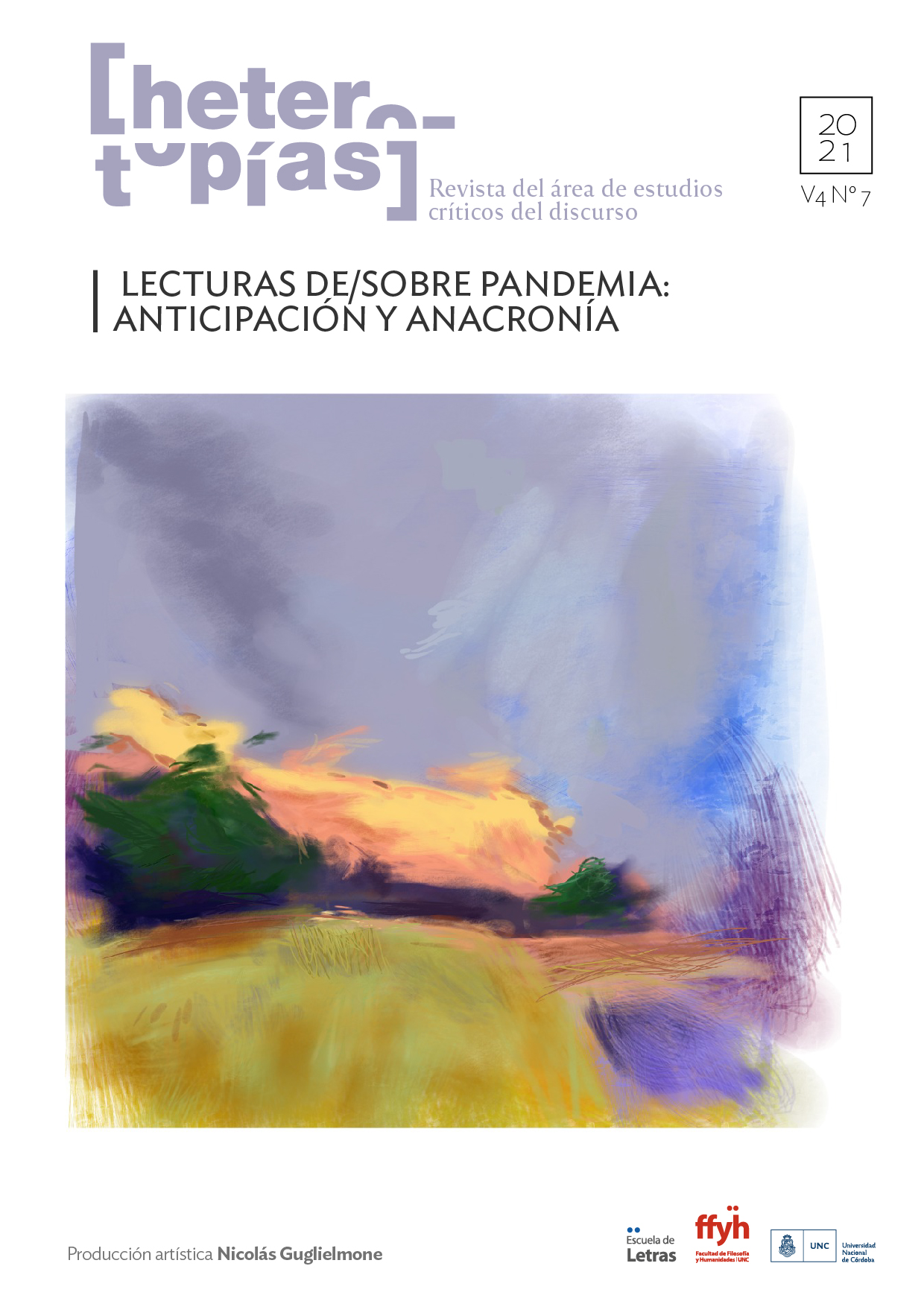Timelines, reading laps, suspended bodies
Main Article Content
Abstract
This work analyzes literary texts by the writers Cristina Peri Rossi (Indicios pánicos (1970) and “Rumores” (1988) and Fernanda Trías (Mugre rosa, 2021) whose plots are set in different historical times (the Uruguayan dictatorship, Europe prior to the fall of the Wall and a possible biological catastrophe) It is not about recovering any linearity of meaning between these events, but rather thinking about how fictions offer different strategies to think about their present and the conflicts that arise from there to imagine other forms of life. These writings reveal that times return in the form of national and global catastrophes and mark bodies, their modes of relationship, the nature of their stories. In this sense, they are closed worlds where the possibilities of escape and change are almost nulls. In different contexts of social catastrophe the self or the different enunciative instances, go through forms of instability and insecurity that are the precarious figures of contemporary subjectivities. Vulnerability and fear function as affective policies deployed in different tones and material conditions as undoubted marks of those presents and they can only be captured in their fissures. Also as traces or ruins that the modes of writing configure and transit to account for those political and human conditions in undoubtedly upset times that question not only the successions and linearities but the relational regime of past, present and future.
The aesthetic proposals of Peri Rossi and Trías, distant but lucidly immersed writings in those spaces, build closed universes fully out of tune with their times in which panic, danger, economic and social insecurity predominate, like wounds of an exhausted humanity
Downloads
Article Details

This work is licensed under a Creative Commons Attribution-NonCommercial-ShareAlike 4.0 International License.
Those authors who have publications with this journal, accept the following terms: Those authors who have publications with this journal, accept the following terms:
a. The authors will keep their copyright and guarantee to the journal the right of first publication of their work, which will be simultaneously subject to the Creative Commons Attribution - Non-Commercial - Share Alike (by-nc-sa) Attribution License; no commercial use of the original work or any derivative works is allowed, the distribution of which must be done with a license equal to the one that regulates the original work.
b. Authors may adopt other non-exclusive license agreements for the distribution of the published version of the work (e.g., deposit it in an institutional telematic archive or publish it in a monographic volume) provided that the initial publication in this journal is indicated.
c. Authors are allowed and recommended to disseminate their work through the Internet (e.g. in institutional telematic archives or on their website) before and during the submission process, which may lead to interesting exchanges and increase the number of citations of the published work. (See The effect of open access).
How to Cite
References
Agamben, G. (2000). Lo que queda de Auschwitz. El archivo y el testigo. Homo Sacer III. Valencia: Pre-textos.
Agamben, G. (2011). ¿Qué es lo contemporáneo? En Desnudez (pp. 17-29). Buenos Aires: Adriana Hidalgo Editora.
Ahmed, S. (2015). La política cultural de las emociones. México: UNAM, PUEG.
Aira, C. (2001). Las tres fechas. Rosario: Beatriz Viterbo Editora.
Butler, J. (2006). Vida precaria. El poder del duelo y la violencia. Buenos Aires: Paidós.
Butler, J. (2010). Marcos de guerra: Las vidas lloradas. Buenos Aires: Paidós.
Domínguez, N. (2003) Salidas de madre para salirse de madre, en Martins, Laura (comp). Reconfiguraciones materiales y simbólicas de la cultura en el Cono Sur posdictatorial, Revista Iberoamericana, Núm. 202, enero-marzo, 2003, 165-18.
Domínguez, N. (2005). Fragmentos de escritura, marcas del tiempo, bloques de realidad. Boletín Nro. 12, Centro de Estudios de Teoría y Crítica Literaria, UNR. diciembre, 68-78.
Domínguez, N (2008) “Presencias póstumas: escrituras del tiempo, tiempos de escritura”, en Rodríguez, Ileana y Mónica Szurmuk (editoras). Trazos y fragmentos: memoria, ciudadanía. Santiago de Chile, Editorial Cuarto propio, 2008, págs.285-309
Foucault, M. (1980). Derecho de muerte y control sobre la vida. En La voluntad de saber. Historia de la sexualidad 1. España: Siglo XXI editores.
Peri Rossi, C. (1980 [1970]). Indicios pánicos. Barcelona, Bruguera.
Peri Rossi, C. (1994). Cosmoagonias. Barcelona: Editorial Juventud.
Trías, F. (2001). Cuaderno para un solo ojo. Montevideo: De los flexes terpines/05.
Trías, F. (2010). La azotea. Uruguay. Punto cero, 1ra. Edición 2001.
Trías, F. (2013). “Bienes muebles” en Trías, Fernanda y Andrés Barba, (des)aires (pp. 13-116). Santiago de Chile: Brutas editoras.
Trías, F. (2015). La ciudad invencible. Montevideo: HUM.
Trías, F. (2021). Mugre rosa. Buenos Aires: Literatura Random House,
